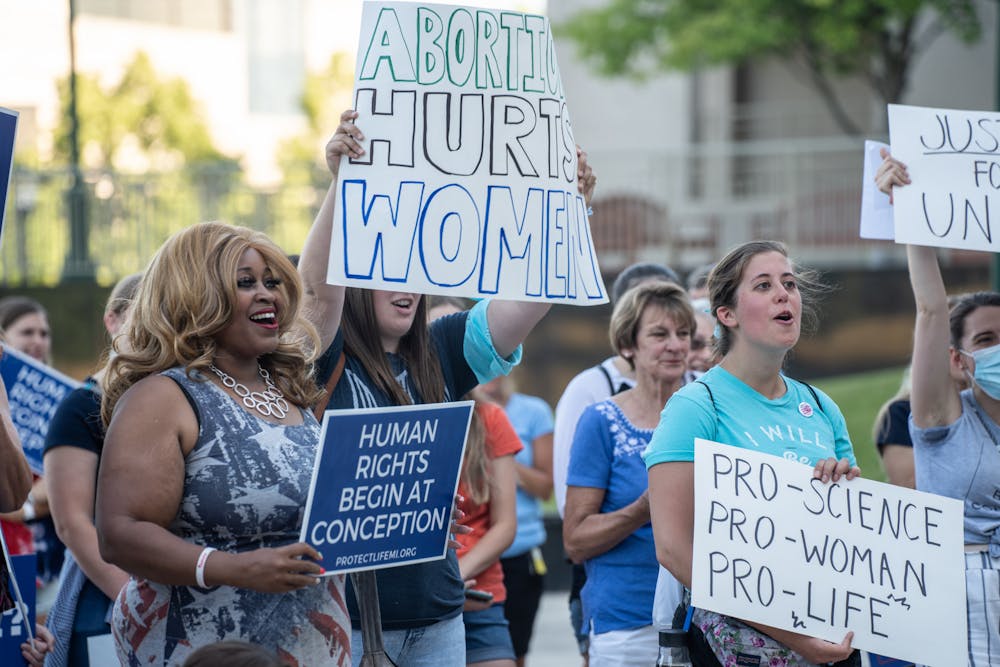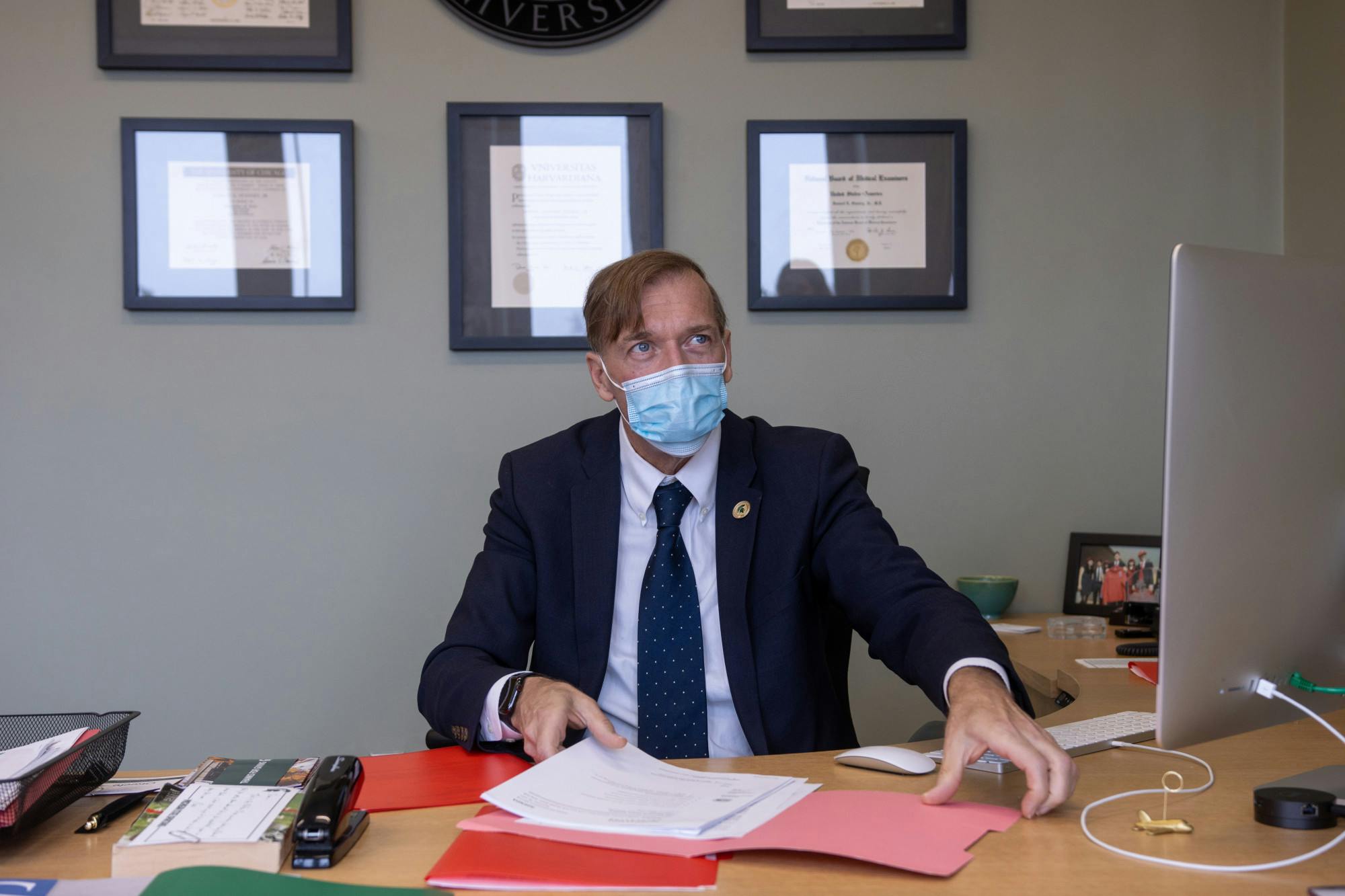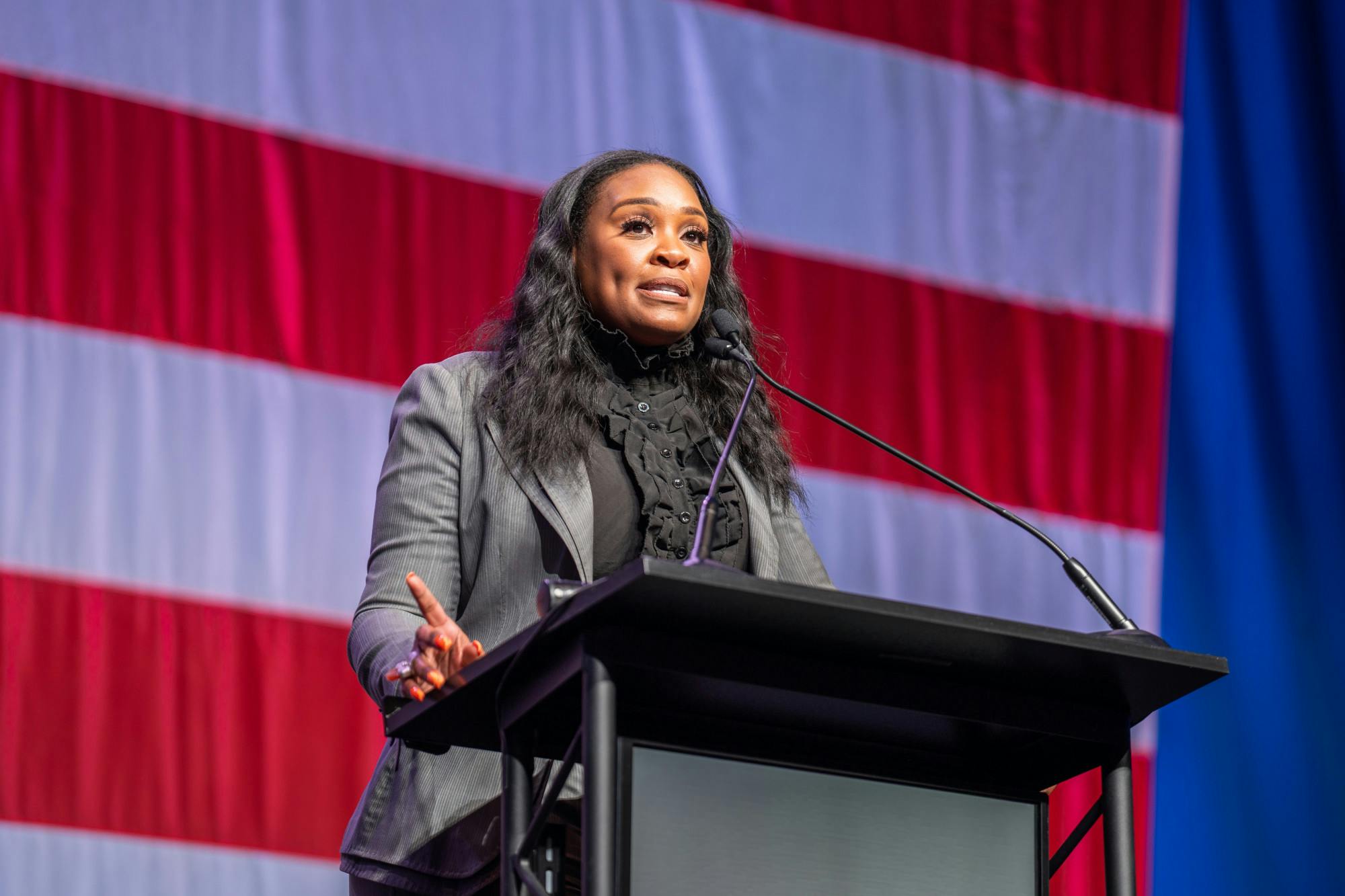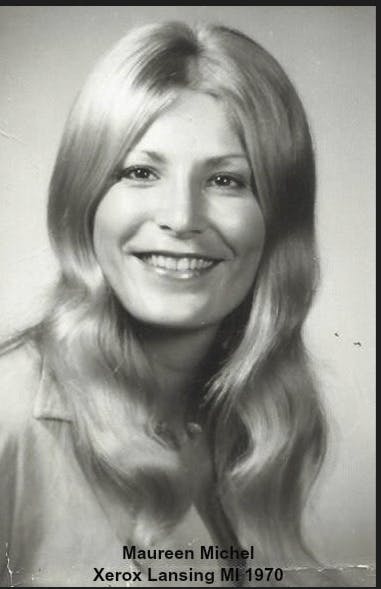On May 3, 2022, hundreds of protesters took to the Michigan Capitol, many holding signs, many crying, all of them frustrated with a leak from the Supreme Court. The previous night brought the news that the right to an abortion protected by Roe v. Wade would be overturned by the end of the Court’s term.
Many Michigan State University students attended. About halfway through the rally, organized by Planned Parenthood Michigan, counter-protesters showed up. Many held their own signs and engaged with the rally-goers.
Leading the counter-protest was human biology junior Audrey Whipple. At the rally, Whipple told The State News she was out advocating for the unborn.
Whipple’s group showed up holding signs that depicted “victims of abortion” because they wanted to show abortion-right advocates “what they were really asking for.”
“I believe if you’re going to advocate for something, you should know what you are advocating for,” Whipple said.
Seven-and-a-half months later, Whipple is still fighting to put the rights of “victims of abortion” front and center.
Since May, different advocacy groups against abortion rights have had many victories and failures, particularly in Michigan. June saw the cumulation of over 50 years of activism, lobbying and legal strategy. This victory was slightly blunted in Michigan due to a lawsuit filed by Planned Parenthood which led to Court of Appeals Judge Elizabeth Gleicher placing an injunction on an abortion ban that was first put in place in 1846 and was last updated in 1931.
Whipple, president of the anti-abortion group Protect Life at MSU, said her group went into the rally that day expecting and preparing for someone from their counter-protesters group to possibly be hurt.
International relations junior Jaryn Crouson was also present at the anti-abortion counter-protest. When counter-protesters arrived, many of the abortion-right advocates used their own signs and umbrellas to block the posters and signs that were brought by Whipple’s group.
Crouson, who chairs the Young American Foundation student chapter at MSU, or YAF, said these actions created a hostile environment and gave the group little room to move around at the rally.
The rally took place during MSU’s finals week when many students were turning in final projects or taking exams. However, by the time students returned in August, the Supreme Court issued an official opinion, written by Justice Samuel Alito, which declared that the 14th Amendment’s Due Process Clause did not protect the right to an abortion.
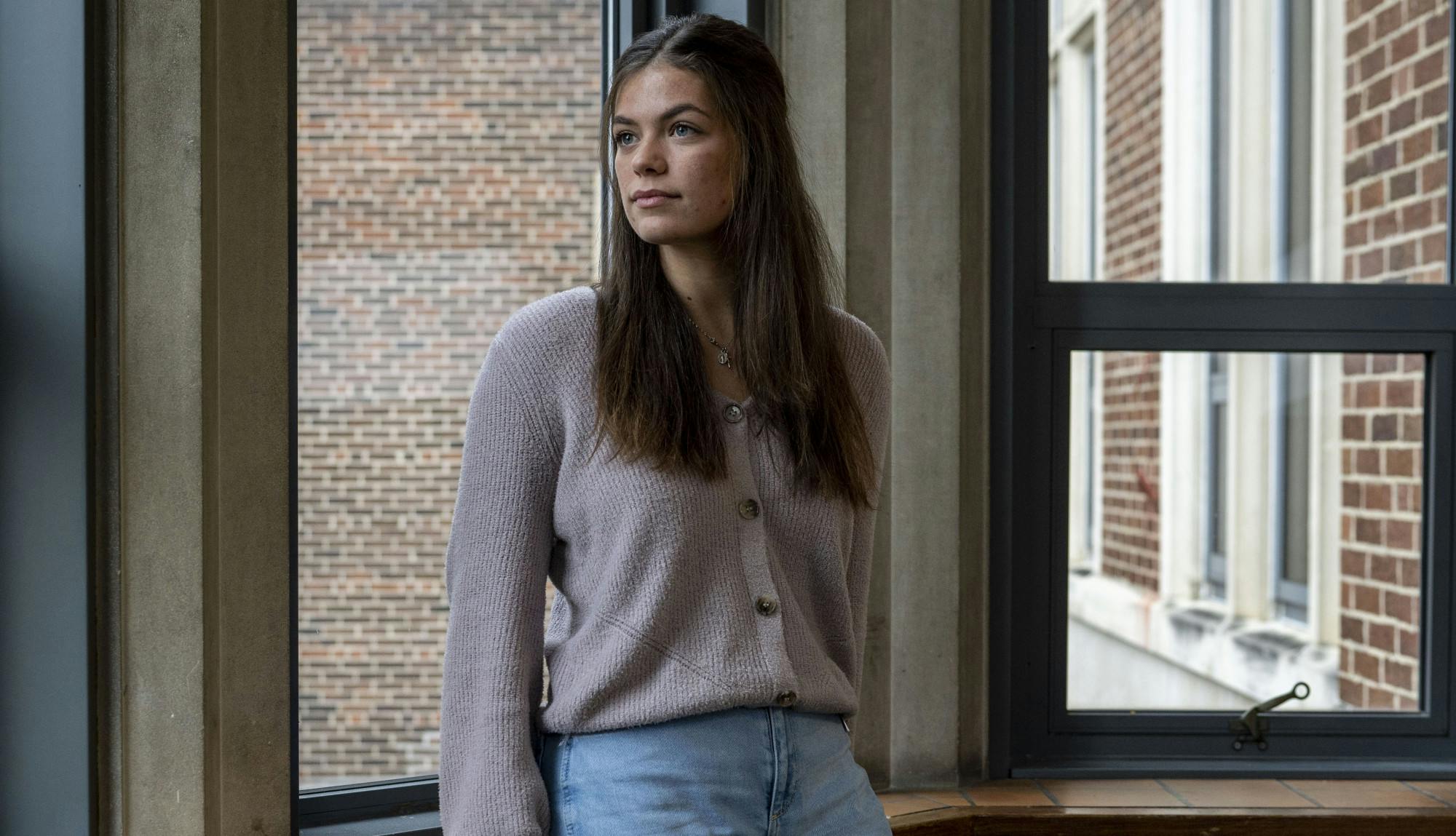
Crouson also recalls the day as being one of excitement. She said the group chats she was in with other anti-abortion advocates were receiving a lot of excited texts. Crouson, who was working for the Americans for Prosperity Foundation at the time, said she was too busy with work to have time to organize but that she planned to concentrate on abortion with YAF when school was back in session.
When Whipple first heard about the ruling, she said she was filled with gratitude and thankfulness, but because the day was so hectic, she had little time to process what was happening.
Yet, the day’s news still left Whipple with questions about what was going to come next for the anti-abortion advocates.
“I think you can prepare as much as you think you can, and then it comes and it actually isn’t how we expect it, so I think that day when I was in bed that night, I had a lot of questions in my head of what does this mean for the pro-life movement?” Whipple said. “What does this mean for what my work will look like going forward and ultimately, obviously, for the unborn who have been saved?”
Soon, anti-abortion advocacy groups based in Michigan shifted their attention to Proposal 22-3, commonly called Proposal 3. This measure, which was placed on the ballot by way of an initiative petition, passed in November, enshrining the right to abortion, contraceptives and other rights into Michigan’s Constitution.
Whipple called the measure “just about the most extreme thing that could have been proposed.” Her work became focused on encouraging others to vote against it.
Crouson’s activity surrounding Proposal 3 was limited. Because YAF is a 501(c)(3) nonprofit organization, the group was not able to directly engage or endorse an issue that may be on the ballot.
After talking to some friends who had been knocking on doors and canvassing voters, Crouson was hopeful that Proposal 3 would not pass.
Support student media! Please consider donating to The State News and help fund the future of journalism.
“It was a really heated issue and it was really neck and neck at that point, whether or not it was going to pass,” Crouson said. “I was really hopeful that it wouldn’t but a part of me knew that it was probably going to pass.”
Nov. 9 was a hard day for Whipple. She was optimistic about Proposal 3 not passing because of polling data she saw a couple of weeks prior. Ultimately, Proposal 3 did pass, with a 13 percent margin. This opened Whipple’s eyes to the work that needed to be done by anti-abortion advocates.
Whipple called the margin by which Proposal 3 passed in Michigan, plus other abortion-related ballot measures in states like Montana and Kansas, as evidence of a slip from “the pro-life culture” that she claims existed prior to the 1973 ruling on Roe v. Wade.
Whipple acknowledges that anti-abortion groups like Protect Life are sometimes not well-received by MSU’s more Democratic-leaning campus. She points to an email sent out and signed by then-President Samuel L. Stanley Jr., then-Provost Teresa Woodruff, and Vice Presidents Melissa Woo and Norman Beauchamp as an example of feeling as though MSU is against Protect Life's goals. The email, sent the day Roe v. Wade was overturned, said “reproductive healthcare is a basic human right.”
“The pro-life position is not an unpopular position, but our culture would make you think that for sure,” Whipple said. “There's a lot of backlash just generally being vocally pro-life. I mean even our school, when Roe v. Wade fell, they sent out an email basically expressing their disappointment. When the culture around you and also the school is pretty transparently against your mission, it does feel unpopular.”
As for what comes next, Whipple said Protect Life at MSU will continue to be active on campus, hoping to see a decrease in performed abortions throughout the state and nation.
The goal of Protect Life at MSU is not just to get abortion made illegal, but convince people that the procedure is unnecessary and unthinkable. Applied engineering sophomore Nathan Vogel, the former vice president of Protect Life at MSU, acknowledged that even if abortion should be illegal, people would still pursue unsafe routes to get one. It is because of this that Vogel views Proposal 3’s passage as not significantly impacting the group’s activities.
“I think a loss like Proposal 3 could very easily allow us to fall into discouragement and despair and feeling like there's no way for our movement to be successful, but that’s not true,” Whipple said. “Because ultimately, even if abortion is legal, we are still doing the work that we’re doing and we convince people that (abortion) is unjust, then ultimately we will see a decrease in the number of abortions.”
Crouson views policymaking as starting with changing the hearts and minds of people and she hopes to continue to demonstrate to others how the anti-abortion advocates see abortion. She is not sure if the advocacy groups will ever get to the point where an anti-abortion amendment could be passed because of the amount of time and money that would require, but she said it will not stop them from fighting to protect life.
As for the outreach that Protect Life at MSU may plan, Vogel said he figures it will be doing some tabling events or doing what their group calls “abortion victim photography,” where a group of people hold up signs with images of “abortion victims” which Vogel said is meant to make people passing by potentially uncomfortable “just by seeing what abortion looks like.”
Whipple also mentions that Protect Life’s statewide group also provides resources and counseling for pregnant people, particularly pregnant students in college. The program, “Project Rosie,” is meant to help with “anything a woman would need” during a pregnancy.
“Whether it be financial, emotional support – often women need emotional support during these situations – housing, basically anything that they need, we’re prepared to step in and fill those gaps,” Whipple said.
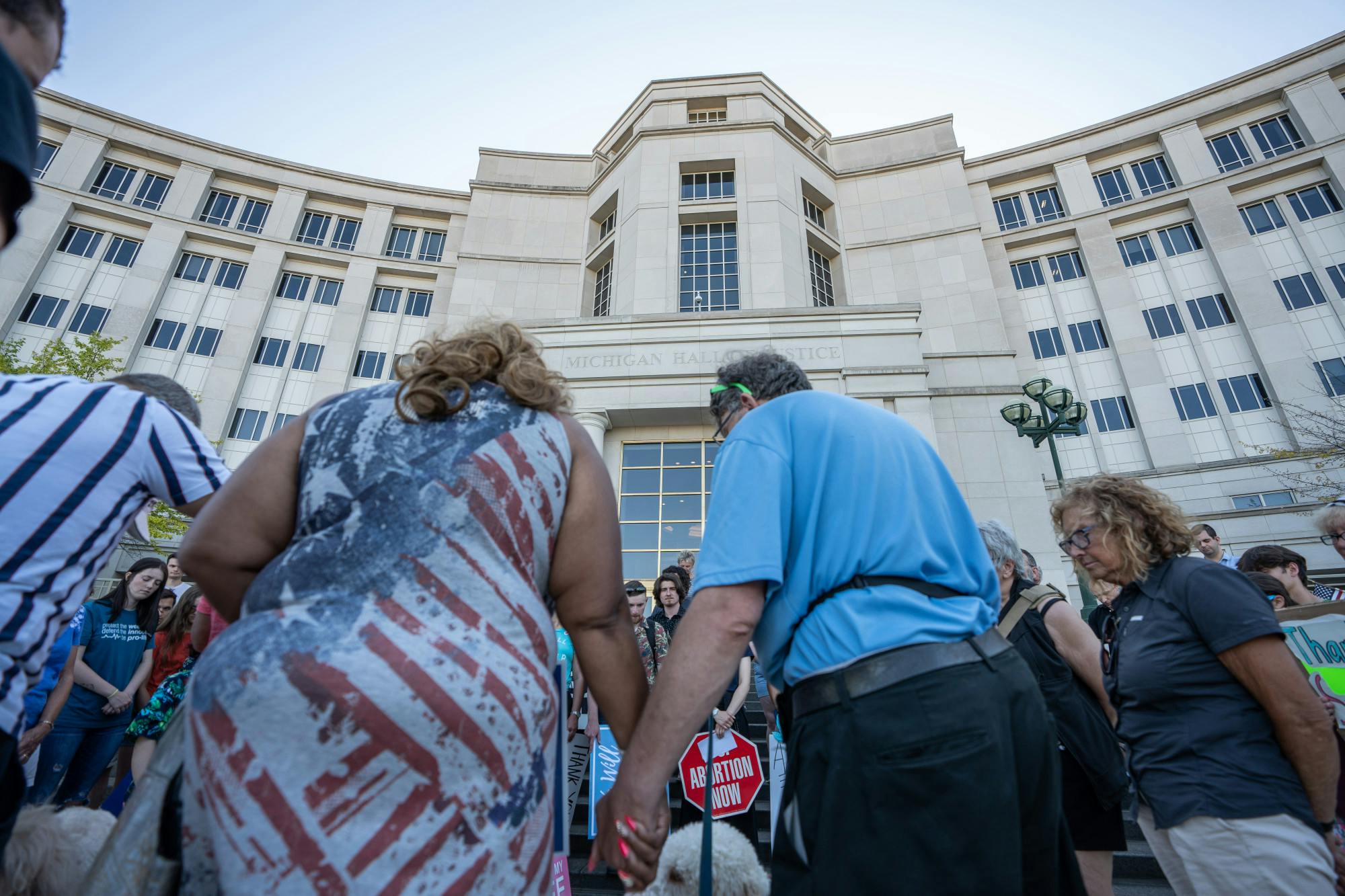
Anti-abortion supporters hold their hands in prayer outside the Michigan Hall of Justice on June 24, 2022.
While Whipple, Crouson and Vogel agree about the next steps of the anti-abortion advocacy campaigns, disagreement over details is bound in a crusade as large as theirs, just as there is disagreement among the Supreme Court justices. Alongside the official opinion written by Alito, Justice Clarence Thomas also penned a concurring opinion on Dobbs v. Jackson, in which he declared his belief that if Roe v. Wade was to be revisited, the high court should also take a look at the cases which provide protections for rights to contraceptives, as well as the right of gay people to have sex and be married.
Whipple, Crouson and Vogel all expressed different opinions about what the direction of anti-abortion groups should be, but for the most part, they do not see the rolling back of LGBTQ+ rights as a part of it.
None of the three are opposed to contraceptives. Whipple does not think that Griswold v. Connecticut should be revisited. However, disagreement arrives over the legality of emergency contraceptives.
When asked if she believes that there should be a right to contraceptives, Crouson said she finds contraception to be a good thing, but the word "right" can be twisted.
"I think 'right' is a bit of a tricky word," Crouson said. "Plan B does not end a human life, so I have no issue with people using Plan B.”
This type of emergency contraceptive is commonly referred to as “morning-after pills.” Plan B One-Step is a brand version of this medication, which acts to delay or prevent ovulation from taking place. They are typically used after other types of contraceptives fail. Emergency contraceptive pills do not end a pregnancy.
The American College of Obstetricians and Gynecologists label emergency contraceptive pills as emergency contraception, but there are segments of the anti-abortion advocates that claim the medication should be illegal, calling them abortion-inducing medication. The Food and Drug Administration, or FDA, recently clarified that the medication is not the same as receiving an abortion or taking abortion pills.
Vogel is among this cohort that believes morning-after pills should be illegal. He labels the medication with the title of “abortifacient” and believes that the morning-after pill ends the life of an embryo and is different from contraceptives like condoms or IUDs, saying that IUDs “kill sperm.”
The IUD, which is a hormonal contraceptive, does not kill sperm, but rather prevents sperm from fertilizing an egg.
Whipple said she believes any form of emergency contraception that prevents “implantation or causes the death of an unborn human” is an abortifacient and should be made illegal. But as for the Plan B medication specifically, Whipple said the topic was not something she was competent speaking on and preferred to not answer on if she thought medication should be legal or not.
Whipple, Crouson and Vogel are in agreement, however, that a doctor who provides abortions should be punished.
Crouson does not think that people who receive abortions should be punished for what she thinks is ultimately a bad choice.
“Women who seek abortions are in very tough positions,” Crouson said. “I don’t believe they should be criminalized for receiving abortions. I would like to see abortion completely outlawed, but I don’t think that women who make what is, in my opinion, a very poor choice, should be criminalized for it.”
Vogel says that he is “very much into following the law” and because of this, he said he would be okay with someone going to prison after receiving an abortion, so long as they received the care and resources they need while imprisoned. People who believe in abortion criminalization are typically among the extreme ends of anti-abortion rights advocates and are sometimes referred to as abortion abolitionists.
The year 2022 was a trying time for anti-abortion advocates. Despite tasting victory once, Michigan groups like Protect Life and Right to Life once again find themselves united to fight for "victims of abortion."
